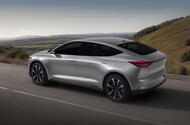This post was originally published on Autocar
The new Lecar 459 Híbrido will be launched in Brazil in 2026
Joint venture aims to builds five million units per year for a variety of car makers, also including Nissan and Volvo
Brazilian start-up Lecar will be the first car maker to use a powertrain supplied by Horse, the joint venture between Renault and Geely.
UK-based Horse, announced last July and officially formed this May, aims to become the “global powertrain leader”, with a goal of building some five million “best-in-class” petrol, diesel and hybrid powertrains per year for car makers including Nissan and Volvo.
The Lecar 459 Híbrido, a crossover set to be launched in 2026, will use a range-extender powertrain centred around Horse’s 1.0-litre three-cylinder HR10 petrol engine.
Similar to how Nissan’s e-Power system works, the engine powers an on-board generator that provides charge to a battery that sends power to electric motors.
Exact specifications of the 459 Híbrido have yet to be confirmed.
The HR10, which has already powered light commercial vehicles in similar range-extender powertrain, has been designed to run using low-emissions petrol and ethanol flex fuels – the main fuels offered in Brazil.
Horse will annually supply Lecar with 12,000 units, produced at the powertrain maker’s plant in Curitiba, Brazil.
Matias Giannini, CEO of Horse parent company Horse Powertrain said: “For Horse, this is a monumental first step into providing combustion engines for passenger-vehicle range-extenders.
“This deal signals our commitment to Brazil, one of the world’s most exciting automotive markets.
“It also signals our relentless commitment to innovation in EREVs [extended-range electric vehicles] – one of the fastest-growing vehicle categories globally – and our ability to support brands and OEMs developing both EVs and combustion-engine vehicles.”
Horse CEO Patrice Haettel added: “This is a significant milestone for Horse as it continues to deliver on our strategy of developing tailor-made solutions for every market.”
Other car makers to push into the EREV market include Mazda and Hyundai. The latter recently became the first global car firm to commit to a broad roll-out of EREVs as it looks to bridge the gap to sluggish EV demand.

